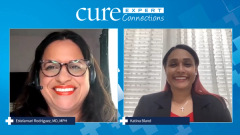
Enrolling in Clinical Trials for EGFR Exon 20–Positive NSCLC
A shared discussion on the importance of enrolling in clinical trials for EGFR exon 20–positive NSCLC and improving access to novel therapy for patients.
Episodes in this series

Transcript:
Estelamari Rodriguez, M.D., MPH: In the future, there are other things to look ahead to. Like I mentioned, these drugs were not available 2 years ago for patients, but now they are. There are a lot of new drugs in the horizon. Poziotinib, which is a drug that your husband was treated with, has data, and the FDA is actually soon to get that drug available for patients. There are other drugs that are on trials closer by. I have patients who have had to travel to have another drug called CLN-081 that is on trials and also has showed responses around the same range of 40%, so you can envision that. We have different generations of these drugs. If patients don’t tolerate 1, or they progress on 1, hopefully they can respond to the other ones, because they have different mechanisms. That gives us the opportunity of treating patients with targeted options. We hope to have many for them.
I can mention CLN-081. I have a patient who is being treated on that. There’s another inhibitor of EGFR/HER2 exon 20 called BDTX-189. There are many other drugs that are currently being tested. A good place to start, and you can also speak to that, is clinicaltrials.gov, which is the database of clinical trials that every trial has to be registered with. You can do a search by state, by mutation, and then discuss that with your doctor who may be going too fast. Sometimes doctors are not even aware that these trials are close by.
Katina Bland: That’s true.
Estelamari Rodriguez, M.D., MPH: Can you share a little bit about how you found the trial and what things you think are there for the horizon?
Katina Bland: Absolutely. CLN-081, now that you’ve mentioned that particular drug, we discovered that clinical trial for CLN-081, and that was the first oral medication and drug that my husband went on. He did really well with that medication until later when there was disease progression that was found. We connected with the Exon 20 Group and partnered with them and located a local clinical trial all for my husband and gained access to that particular medication. It’s a wonderful thing that the Exon 20 Group is doing and that they are continuously advocating, not just for the current medications that we have, but for a robust pipeline of medication and drugs. We want an endless supply. I’m so pleased that we’re in an era now where we do have 2 medications that have already been approved and we have more medications that are right behind them in the pipeline to also be approved. The more the merrier.
Until this disease can be cured, the battle’s not over. We still need to be pursuing more drugs. To that effort, the Exon 20 Group has an international research consortium, and what we’re doing there is working really hard to solve the problems in drug design and drug development issues in the hopes that in the future we’ll have more drugs. We want to have an endless supply, and not only have more of them, but speedier development, so that we can ramp up the different options that patients have to combat this disease. Our Exon 20 scientists are completely determinate at seeing that mission through that we don’t stop now and get comfortable because we have a few drugs, but we continue to push forward developing more and more until we find the drug that meets every need. Until that has happened, the fight isn’t over and we shouldn’t let up.
Estelamari Rodriguez, M.D., MPH: You’re right. We are really at the beginning of the new treatments for EGFR 20 insertion. We’re not at the end or destination. We have seen that, from our history over the last 10 years with the common mutations, there are resistant pathways that emerge with the first agents, and then you can develop a better drug to treat the mutated receptor only, and potentially lead to less toxicity to other receptors in the skin and the GI [gastrointestinal] tract. There’s definitely a lot of room to have better, more effective drugs that target potential resistance, and also drugs that will cause less toxicity.
Transcript edited for clarity.





